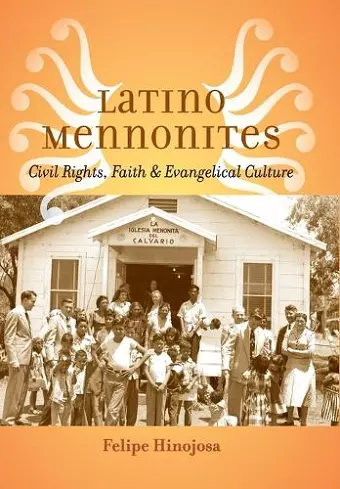Latino Mennonites
Civil Rights, Faith, and Evangelical Culture
Format:Hardback
Publisher:Johns Hopkins University Press
Published:15th Apr '14
Currently unavailable, currently targeted to be due back around 20th January 2025, but could change

Hinojosa adeptly examines how African American civil rights struggles, relations with Latin Americans, and trends in evangelical religion shaped the faith and activism of U.S. Latino Mennonites. Latino Mennonites is both a superb narrative history and a model for the scholarly analysis of religion within its wider social context. -- Timothy Matovina, University of Notre Dame Deftly weaving together stories of everyday life with analysis of economic and political structures, Hinojosa reconstructs the spaces where the identity 'Latino Mennonite' took shape. Moving from South Texas to Chicago to Puerto Rico, from Bible studies in homes to social justice protests in the streets, Hinojosa illustrates the complex manner in which Latinos and blacks were able to claim belonging-and in the process transform-the historically white Mennonite Church. -- Jane Juffer, Cornell University, author of Intimacy Across Borders: Race, Religion, and Migration in the U.S. Midwest Latino Mennonites is a pathbreaking study of the hidden history of Latinos in the United States-the role of religion and politics. With masterful historical skills and a nuanced historical perspective, Felipe Hinojosa unearths the history of Latino Mennonites and contributes to the developing historiography of Latino religious studies and to a more inclusive history of American religions. -- Mario T. Garcia, University of California, Santa Barbara, author of Catolicos: Resistance and Affirmation in Chicano Catholic History
In Latino Mennonites, Hinojosa has interwoven church history with social history to explore dimensions of identity in Latino Mennonite communities and to create a new way of thinking about the history of American evangelicalism.Felipe Hinojosa's parents first encountered Mennonite families as migrant workers in the tomato fields of northwestern Ohio. What started as mutual admiration quickly evolved into a relationship that strengthened over the years and eventually led to his parents founding a Mennonite Church in South Texas. Throughout his upbringing as a Mexican American evangelico, Hinojosa was faced with questions not only about his own religion but also about broader issues of Latino evangelicalism, identity, and civil rights politics. Latino Mennonites offers the first historical analysis of the changing relationship between religion and ethnicity among Latino Mennonites. Drawing heavily on primary sources in Spanish, such as newspapers and oral history interviews, Hinojosa traces the rise of the Latino presence within the Mennonite Church from the origins of Mennonite missions in Latino communities in Chicago, South Texas, Puerto Rico, and New York City, to the conflicted relationship between the Mennonite Church and the California farmworker movements, and finally to the rise of Latino evangelical politics. He also analyzes how the politics of the Chicano, Puerto Rican, and black freedom struggles of the 1960s and 1970s civil rights movements captured the imagination of Mennonite leaders who belonged to a church known more for rural and peaceful agrarian life than for social protest. Whether in terms of religious faith and identity, race, immigrant rights, or sexuality, the politics of belonging has historically presented both challenges and possibilities for Latino evangelicals in the religious landscapes of twentieth-century America. In Latino Mennonites, Hinojosa has interwoven church history with social history to explore dimensions of identity in Latino Mennonite communities and to create a new way of thinking about the history of American evangelicalism.
Felipe Hinojosa provides in this work a carefully crafted and rendered history of Latino Mennonites from the 1930s to the 1980s that builds on Latino studies and scholarship and also offers a fresh approach to Latino religious studies... Hinojosa's focus on interethnic co-operation as well as internal tensions is a turning point for Latino religious studies because it adds a vital comparative angle... Latino Mennonites is a wonderful story told, a model of engaged, revisionist Latino religious studies that should be read and assigned in upper-undergraduate-level and graduate-level classes as a model for the future of Latino religious studies scholarship. -- Kristy Nabhan-Warren Journal of American History He has not only contributed to the scholarly understanding of the way ethnic identity intersects with faith and politics, but has done so by telling the previously unknown story of Latino Mennonites in the United States -- Curtis W. Book Brethren in Christ History and Life [ Latino Mennonites] can help us understand a bit better not just important streams within American evangelicalism but some of Iowa's present and future religious landscape as well. The Annals of Iowa A detailed and fascinating history of the Mexican and Puerto Rican experience in the Mennonite Church... Latino Mennonites documents the unique way in which Latino Mennonites straddle the border of evangelicalism and Anabaptism, and it also illustrates the intersection of civil rights, faith, and evangelical culture... Hinojosa has an engaging style, and the depth of the historical context he provides allows the personalities o his informants to shine through. Sociology of Religion Hinojosa has an engaging style, and the depth of the historical context he provides allows the personalities of his informants to shine through. Sociology of Religion Latino Mennonites is an essential read for graduate students, scholars, and anyone interested in better understanding the political and social rise of Latinos and Latinas in the United States. With Latino Mennonites, Felipe Hinojosa has set a standard for the historical and cultural study of Latino evangelicals throughout the United States. The Mennonite Quarterly Review A pleasure to read with clear and engaging prose, Latino Mennonites is an important study of the interaction between civil rights movements and religious communities in identity formation. Nova Religio
ISBN: 9781421412832
Dimensions: 229mm x 152mm x 26mm
Weight: 590g
328 pages